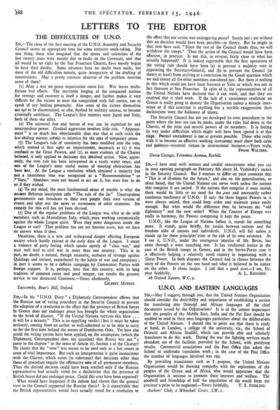LETTERS TO THE EDITOR
THE DIFFICULTIES OF U.N.O.
SIR,—The close of the first meeting of the U.N.O. Assembly and Security Council seems an appropriate time for some tentative stock-taking. For one thing, those who imagined that the errors and calamities of the last twenty years were mainly due to faults in the Covenant, and that all would be set right by the San Francisco Charter, have mostly begun to have their doubts. Some advances have no doubt been made, but most of the old difficulties remain, quite irrespective of the drafting of constitutions. May a pretty constant observer of the problem mention some of them?
(t) After a war no peace organisation starts fair War leaves multi- farious bad effects. The inevitable longing of the conquered nations for revenge and recovery is itself a danger, and further makes it very 'difficult for the victors to treat the vanquished with full justice, not to speak of any healing generosity. Also some of the victors themselves are apt to be discontented, or else, flushed by military success, to become criminally ambitious. The League's first enemies were Japan and Italy, both of them our allies.
(2) The universal fear and horror of war can be exploited by any unscrupulous power. Gradual aggression involves little risk. " Appease- ment " is so much less objectionable than war that at each crisis the Jaw-abiding nations submit to injustice for the sake of temporary peace.
(3) The League's rule of unanimity has been modified into the veto, which seemed at first sight an improvement, inasmuch as (r) it was confined to the Great Powers, and (2), as most students of the Charter believed, it only applied to decisions that involved action. Now, appar- ently, the veto rule has been interpreted in a vastly wider sense, and one of the League's most useful means of meeting obstruction has been lost. At the League a resolution which obtained a majority but not a unanimous vote was recognised as a " Recommendation " or r" Voeu." Members were not bound to act on it, but were free to do so if they wished.
(4) To my mind, the most fundamental cause of trouble is what the ancient Behistun inscription calls "The rule of the lie." Unscrupulous governments can broadcast to their own people their own version of events and shut out the news or statements of other countries. No remedy for this evil has yet been devised.
(5) One of the regular problems of the League was what to do with 'members, such as Mussolinian Italy, which, were working systematically against the whole League spirit. Were they more dangerous inside the League or out? That problem has not yet become acute, but we have no answer when it does.
Meantime, there is a new and widespread danger affecting European society which hardly existed in the early days of the League. I mean a violence of party feeling which speaks openly of "class war," and may well lead to civil war in more than one country. This is in part, no doubt, a natural, though excessive, outburst of revenge against Quislings and traitors, exacerbated by the habits of war and conspiracy ; in part it seems to be a definite campaign by Communist Parties with foreign support. It is, perhaps, here that this country, with its long tradition of common sense and good temper, can render the greatest service to our distracted Continent.—Yours obediently,
Yatscombe, Boar's Hill, Oxford.
GILBERT MURRAY.


























 Previous page
Previous page